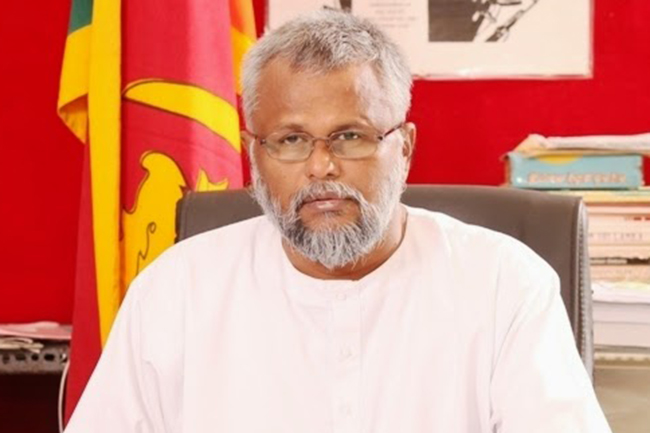
Illegal fishing by TN fishermen to figure in India-Sri Lanka talks: Douglas Devananda

Sri Lankan President Ranil Wickremesinghe’s visit to India on July 21 is aimed at further strengthening all-round relations between the two countries and will also cover the dragging issue of illegal fishing by Tamil Nadu fishermen in the island’s waters, Douglas Devananda, a Sri Lankan minister who will accompany the president, said.
Fisheries Minister Devananda, 65, a former Tamil guerrilla fighter, said in an interview to The Federal from Colombo that he would take up with the Indian government the unending illegal fishing in the island’s territorial waters by what he described as “a section of fishermen” from Tamil Nadu using bottom trawlers.
These trawlers, he underlined, caused terrible losses to sea resources across northern Sri Lanka, destroying marine life indiscriminately and coming in the way of an economic revival of the island’s Tamil fishing community.
Also read: Tamil diaspora joins chorus, asks Modi to tell Ranil to hold provincial polls
“Those worst affected because of these bottom trawlers are not the Sri Lankan military but ordinary Tamil fishermen who live in the north and who for years could not fish properly due to the war,” he said. “Once the war got over and they tried to stand on their own legs, the Indian trawlers have proved a major nuisance.”
Bottom trawlers
According to him, the bottom trawlers end up killing 18 kg of small fishes just to catch 1 kg of their favourite catch. “You can imagine what kind of destruction they cause if their catch is as much as 50 kg a day. And all this takes places in Sri Lankan waters where they are not supposed to enter. Who suffers? The Tamil fishermen, of course,” he told The Federal.
This has led to repeated arrests of Tamil Nadu fishermen and the seizure of their trawlers by the Sri Lankan Navy, in turning triggering diplomatic tensions between Colombo on the one hand and Tamil Nadu and India on the other.
Some time back, a peeved minister Devananda ordered the auction of seized Indian trawlers after New Delhi failed to pay a compensation of 500 million Sri Lankan rupees ($2.5 million) to Tamil fishermen in the island.
Also read: Once in majority, Tamils reduced to minority in eastern Sri Lanka
Wickremesinghe will also discuss various economic initiatives India can stake up to speed up Sri Lanka’s economic recovery when he holds talks with Prime Minister Narendra Modi in Delhi on Friday, Devananda said, in responses to questions sent by e-mail and on phone.
The proposed agreements would cover the subjects of renewable energy, an oil pipeline, electric cables, an economic zone in the eastern town of Trincomalee and the supply of medicines and health facilities which continue to be in short supply in Sri Lanka.
Another area where India and Sri Lanka are likely to sign a pact will cover dairy industry and milk production, the minister added.
Indian help
Ever since Sri Lanka was plunged into an unprecedented economic crisis last year, triggering mass protests that forced then president Gotabaya Rajapaksa to flee the country, India has provided $4 billion worth of financial aid. India has also stepped up economic engagements with Sri Lanka at various levels.
Opinion: Why LTTE can never be revived
“Sri Lanka is yet to recover completely from its economic crisis,” Devananda admitted. “The visit will provide our president an opportunity to thank the Indian leadership directly for all the help India has given and discuss what else can be done in the present circumstances.”
He added that India and Sri Lanka had “no problems” and Wickremesinghe’s brief visit – his first to India since becoming the president last year – will further cement the bilateral and strategic relations.
Devananda, who heads the Eelam People’s Democratic Party (EPDP), said that while Wickremesinghe was determined to guide Sri Lanka wriggle out of its economic crisis, “it will take two to three years more for our country to recover fully” from the present mess.
He said life for ordinary Tamils in Sri Lanka’s north and east was slightly better now compared to when all-round shortages of even essential commodities gripped the country last year. “But some scarcities remain. The Tamils have not only suffered from economic problems but natural disasters too.”
Sri Lanka elections
Devananda, clearly reflecting the Sri Lankan’s government’s thinking, said elections to provincial councils, including in the island’s north and east, may not take place soon. According to him, Sri Lanka will first hold fresh presidential and later parliamentary elections, and “then will come other elections”.
Devananda found fault with the LTTE, whose armed struggle for an independent Tamil homeland left hundreds of thousands dead before it was crushed by the military in 2009, for rejecting various peace moves, including the 1987 India-Sri Lanka Accord.
The LTTE had virtually repudiated the Norwegian-sponsored peace process and ignited a war with the Sri Lankan military in 2006, leading to its own destruction just three years later, ending a quarter century long armed conflict.
“They had many opportunities to build peace,” Devananda said. “It is precisely because I opposed them strongly is why they repeatedly tried to kill me.”

